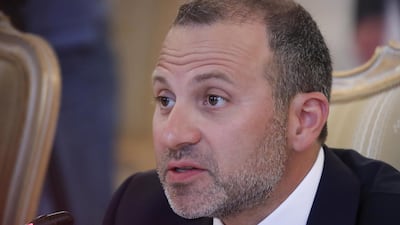Last Saturday, at an emergency meeting to discuss recent developments in Syria, Lebanon’s foreign minister Gebran Bassil called for the country to be reintegrated into the Arab League. The appeal, issued at the meeting of Arab foreign ministers in Cairo, was controversial at home but it also served to underline how far relations have developed between the Aounist movement – which Mr Bassil now heads – and Damascus.
It was most likely not a coincidence that Mr Bassil chose that particular weekend to issue his offer to the Syrians. On October 13, 1990, Syrian forces expelled Michel Aoun, Mr Bassil’s father-in-law and Lebanon’s current president, from the Baabda presidential palace, at a time when he was engaged in a war to force the Syrian army out of Lebanon. By timing his remarks to correspond almost exactly to that day, the foreign minister was signalling that he continues to support the pursuit of friendly relations with the Assad regime.
A significant part of Mr Bassil’s calculations are linked to his presidential ambitions. He knows that one of his main presidential rivals, Suleiman Franjieh, remains a favourite of the Syrians, given his close personal relations with the Assad family. So to secure Syrian backing for his own eventual election, Mr Bassil needs to give the Syrians something solid like Lebanese diplomatic backing.
The foreign minister went a step further on Sunday, announcing that he would visit Damascus to persuade Syrian President Bashar Al Assad to take back Syrian refugees now in Lebanon. The announcement caused consternation among political forces in Beirut opposed to Mr Al Assad. However, Mr Bassil calculated – rightly – that his Maronite Christian base would welcome any step that helped repatriate the one million-plus refugees in Lebanon.
Although petty politics might explain Mr Bassil’s manoeuvres, they are not sufficient on their own. The foreign minister has also exploited a mood of fear among numerous Christians about what might have happened had Mr Al Assad been overthrown militarily. Although few like the Syrian regime, many Christians have responded with the reflex of a minority, fearing they would have faced an extremist Sunni Islamist regime had the Syrian president been ousted.
It is revealing that in the past, Mr Bassil had seemed open to the idea of an alliance of minorities. There was certainly much opportunism there, a way of justifying the Aounists’ ties with the Shiite Hezbollah and the Alawite regime in Syria. Yet the foreign minister is no innovator and one cannot underestimate the depth of concern among his co-religionists that Christians are disappearing in a Sunni-majority Middle East.
Such an attitude is hardly advisable for anyone concerned with keeping a long-term Christian presence in the region, which requires being on good terms with the majority. But Mr Bassil has often behaved like a bull in a china shop, relying on his populist impulses to accumulate power, without any consideration for what appealing to minority sentiment might mean for his community in the future.
That is because the foreign minister seems blithely indifferent to the monumental suffering caused by the Assad regime. His words of sympathy and approval come across to many people, particularly many Lebanese Sunnis, as enabling a regime that has engaged in massacres. For Maronites to find themselves associated with such a legacy is not something that can benefit coexistence.
The irony is that the regime of Hafez Al Assad, Bashar’s father, was most responsible for undermining Maronite power in Lebanon during the civil war of 1975 to 1990. The notion that there was any kind of minority solidarity between the Syrian leadership and Christians is ludicrous, which explains why the Maronites always came across as the Syrians’ staunchest foes. Mr Aoun himself at one time embodied that hostility.
However, both he and Mr Bassil moved beyond that in 2005, when they believed that much of Lebanon’s political class sought to isolate Mr Aoun on his return from exile in France. Not for the first time, internal Lebanese divisions led to a complete reversal of alliances as Mr Aoun allied himself politically with Hezbollah and Syria’s allies, believing they would help him secure the presidency.
He wasn’t wrong in the end. However, Mr Bassil’s embrace of the Assad regime effectively contradicts what had always been a publicly expressed central principle of the Aounist movement, namely the need to preserve Lebanon’s sovereignty. By appealing to Mr Al Assad by suggesting that he be invited back into the fold, the foreign minister is keeping alive that old habit of allowing major regional or international decision-makers to effectively dictate who gets to be Lebanon's head of state.
Mr Bassil might be irritating and noisy to many Lebanese but he seems to have understood the basic rules of populist politics: play on what the public regards as visceral, embrace shamelessness, and when facing opposition, double down and attack. That is not a rulebook for a consensual presidency – but the foreign minister doesn’t care. He will do what needs to be done to become president, even if Lebanon pays a heavy price as a result. In the service of self-interest, duplicity is no vice.
Michael Young is editor of Diwan, the blog of the Carnegie Middle East programme, in Beirut


